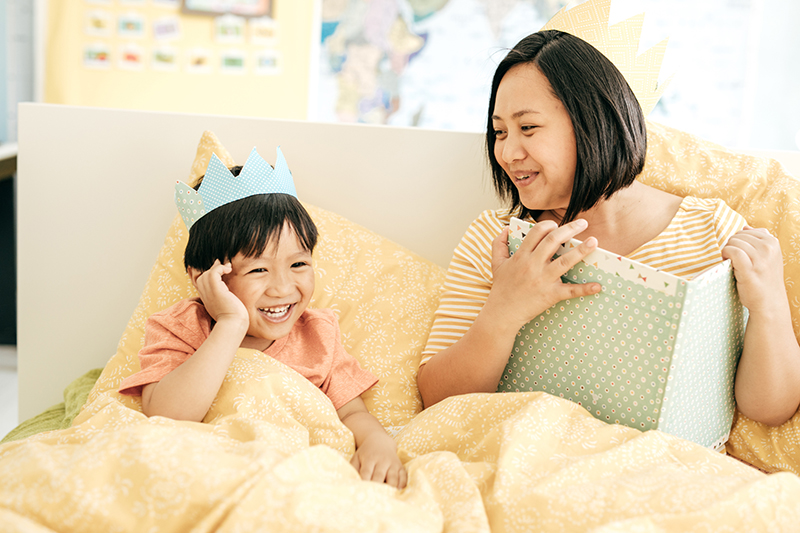Families For Life | Relationships with Preschoolers: Ideas and Tips

During the pre-school years, your child is learning and developing all the time, and also building more confidence and self-esteem. Understanding your pre-schooler’s emotions and social development helps you connect with your child during these years.
Understanding pre-schoolers: the basics
The pre-school years are one of the most important periods in a child’s emotional development.
Your child is building on the confidence and self-esteem he has been developing since the baby and toddler years. The way children feel about their rapidly blossoming abilities and the way they deal with more complex emotions have a huge influence on their ability to cope with life’s stresses.
Your job during the pre-school years is to help your child develop self-esteem, coping skills, problem-solving skills and social skills.
These skills will help your child cope with emotional changes, keep going in the face of frustration, have hope, control extreme emotional impulses, and feel compassion and empathy. These are important ingredients for success and wellbeing in life.
Most of your pre-schooler’s development and learning happens through play. Your child learns through playing by herself or with you at home, and also through playing with her teachers and other children at pre-school or kindergarten.
Nurturing your child’s self-esteem
Good self-esteem means that you have a positive view of yourself and your abilities. Children who have good self-esteem feel that they’re valued and they can manage the world to some degree.
Good self-esteem helps you deal with life’s disappointments and problems. It lets us understand and accept that things don’t always work out, and respond to this in a positive way – for example, ‘What can I do to fix that bad thing that happened to me?’ or ‘Bad things happen to everyone. I can get over this’.
You can help your child develop self-esteem by:
fostering your child’s sense of who he is
helping your child develop confidence in his abilities
giving your child positive attention
helping your child learn to accept mistakes.
Fostering a sense of self
Your child’s self-esteem comes from knowing that she’s connected to others and loved and valued for who she is. Here are some ideas for fostering these feelings:
Teach your child who he is by explaining who’s who in the family, how they’re related to others and what you did when you were a child.
Make family photo albums and let your child collect family treasures like souvenirs from family holidays.
Keep and display your child’s drawings, letters and photos. This will also help your child see how she has changed and grown over the years.
Developing confidence in abilities
Encourage your child to work out problems and make decisions by himself. But make sure he knows you’re there to help if he needs you.
When your child masters a new skill, encourage her to practice it before starting something harder. Repetition helps your child build confidence and understand that things usually get easier.
Giving positive attention
When your child does what he’s asked, or does something nice for you, let him know. Say things like ‘Thank you’, ‘That was helpful’ and ‘You do that really well’.
Be generous with praise, but also be genuine – your child will usually know if you’re faking it. If you give her too much praise, your child will learn not to value it.
Hug your child, listen, make time even when you’re busy, let your child help you, put your child’s drawings on display, and take part in pre-school events if you can.
Always avoid saying things that put your child down, like ‘You make me tired’, ‘You’re hopeless’ or ‘You’re such a naughty boy’.
Accepting mistakes
Be realistic, but allow your child to take some risks. Try to avoid overprotecting your child.
Tell your child that everyone makes mistakes and that mistakes help us to learn. It’s important that children understand that if they make a mistake in one area, they’re not bad at everything.
Encourage your child to think and say positive things like ‘It’s OK that my team didn’t win today’, ‘I can work out this problem if I just keep trying’, and ‘I feel good when I help someone, even if they don’t thank me’.
Protecting your child from every failure by stepping in and making things right can stop him from learning that not everything works out the way we want it to. It can also mean that your child doesn’t learn to cope with disappointments and failures and always needs you to make things better for him. And it can send the message that you don’t think your child can handle anything by himself.
Developing your child’s coping skills
Good coping skills help us to deal with problems, frustrations, threats and challenges. The way a child deals with these things as a baby and toddler – crying and tantrums – don’t go down well in later childhood, or as an adult in the office!
If your child learns to understand the way she feels in different situations – especially difficult situations – this is a great first step towards developing coping skills.
Pre-schoolers tend to deal with threatening situations through symbolic play – they create make-believe situations where they can defeat whatever is frightening them. They feel better by acting out control over a frightening situation. Older children might find it comforting if you also explain what’s going on in a frightening situation.
Tips for promoting good coping skills in your child
Teach your child to be aware of and understand his own feelings. You can use children’s games and stories to talk about how your child might feel in different situations.
Help your child to notice and deal with negative feelings – for example, sadness, frustration, embarrassment – when they first happen, before they get too strong to manage.
Teach your child that while everyone likes to win, doing your best is more important. You can be a role model for this attitude.
Help your child think about whether things are fair or unfair – for example, waiting her turn instead of pushing in front of another child.
Let your child know that sometimes things go wrong even when he does the right thing – for example, ‘Not everyone shares their toys, even if you ask nicely’.
Model positive thinking in difficult situations – for example, ‘It’s scary to ask Selvi if you can play because she might say no. But she might also say yes. Then you can join in and have fun together’.
Fostering your child’s problem-solving skills
Problem-solving skills are important for making decisions and sorting out conflicts.
Conflict isn’t always a bad thing. Through conflict, children learn that people experience different thoughts and feelings. Children also learn the difference between right and wrong and how their behaviour affects other people.
Tips for helping your child develop problem-solving skills
If your child is arguing with other children, help your child to work out a solution to the problem.
Avoid blaming if children are fighting. When everyone is calm enough to talk sensibly, encourage children to think of different ways to solve the problem and agree on a solution that everyone can live with.
Make sure the solution is followed through, let everyone know when the problem is sorted out, and praise everyone for helping to sort it out.
Developing your child’s social skills
Having good relationships with a range of people is very important for a person’s mental health. To develop these relationships, children must learn social skills like:
communication skills – using the right words for the situation, smiling, using eye contact and listening
entry skills – knowing how to join a group
skills for sharing, taking turns, following rules, cooperating, managing conflict, helping others
skills for being a good friend – thinking about how others might feel, and being kind, helpful and affectionate
How children learn social skills
You tend to have the most influence on how your child’s social skills develop, but your child also learns from other family members, friends and peers at child care and pre-school.
There’s no recipe for teaching social skills – it’s often a case of watching to see what works for your child.
When pre-schoolers are learning social skills, they can find it very hard to take turns, negotiate difficult situations, and sort out conflict. It helps to be prepared for this.
Developing social skills is like any other skill. Children need to know what these skills look like and they need to practice them. Practice helps children get better at making and keeping friends.
Tips for helping your child develop good social skills
Show your child what good social skills look like – for example, listening when people talk to you, being nice to people and doing kind things for your friends. Your child will learn from the way you behave.
Encourage pre-schoolers to be aware of the feelings of others. For example, ‘Zhe Ming has been waiting for a while to have a go. I wonder how you might feel if you had to wait that long. What’s a friendly thing to do about this?’.
Give your child lots of opportunities for imaginary play, dress-ups, playing shop, acting out stories and rhymes, playing with other children, constructing things with bricks, cut-outs and dough, and helping around the house with simple chores. This is a fun way to teach your child how to be friendly.
When your child starts school, you can help her with social skills by encouraging her to play games that involve winning and losing – like ‘snap’ or ‘snakes and ladders’ – taking her on family trips and outings, and getting her involved in sport or other group activities.
© raisingchildren.net.au, translated and adapted with permission
Explore more

DID YOU KNOW?
Playing with pasta pieces, especially macaroni, can be an excellent way to boost your child's acquisition of fine motor skills!
READ MORE